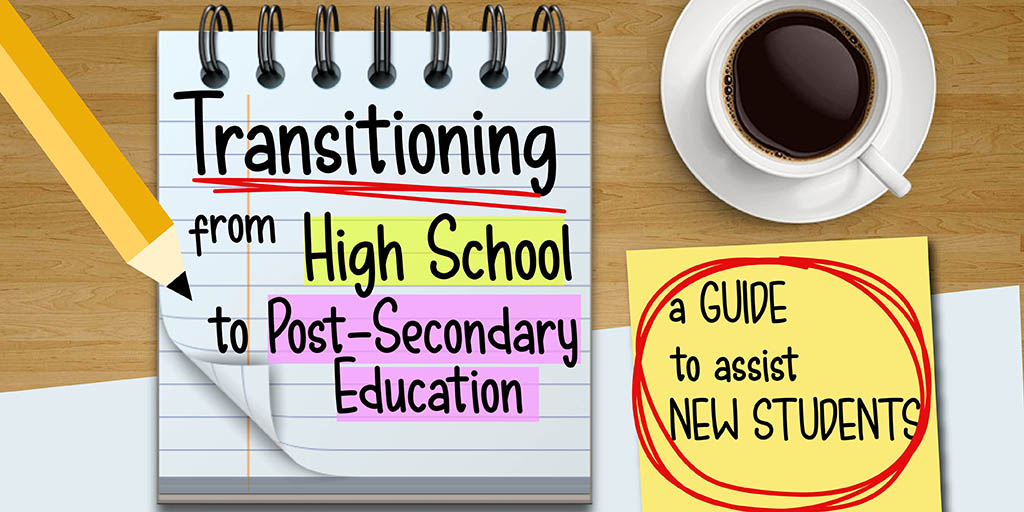Transitioning from high school to post-secondary education

Adjusting to a new environment is always tricky and one of the most difficult transitions of all is from high school to post-secondary school. Below is a guide to assist new students in aspects that they may not be used to and help them to develop necessary habits in the college environment.
Time Management
Time management is a key aspect to a successful college experience. In high school, your time was more or less managed for you, as mandatory classes began and ended at the same time every day. Furthermore, with the number of small scale projects, it was possible to cram a week’s worth of homework into one night. At first glance, college may seem less daunting in its time requirements, due to a schedule that changes daily, far less time spent in subjects each week and fewer assignments. Not only that, but for most classes, attendance is your own choice and there’s usually no penalty if you are truant. However, you’ll soon discover that it’s very important to attend all your classes as things move much quicker and you are taught much more in much less time. If you need to miss class, it’s important to have a friend take notes to later borrow, as most teachers won’t give notes to students who were absent. Though there are less assignments, those that are given out are normally quite large in the amount of work required and could take several weeks of research and writing to complete. It is therefore important to spend a little bit of time each night working on projects and readings because if you leave them until the last minute, they probably won’t get finished in time.
Due Dates and Deadlines
In high school, if a project deadline or a test was missed, it was fairly easy to get an extension by talking to the teacher or bringing in a note from a parent and/or doctor. In college however, if a project is not handed in on the day it is due, this can either mean a large reduction of your mark or no mark at all. Although this may seem intense, professors are simply trying to train students for future work with clientele, where if you don’t send a something in on time, it could mean your job. To make matters worse, teachers may not even remind you of due dates or not inform you if you haven’t handed something in. It is therefore important to go to class and receive all this information when first announced. In the same regards, it is especially important not to miss exams. They can be weighed for a large portion of your final grade and if missed, students are not given a chance to rewrite them. All this said, should a tragedy or intense illness prevent a student from handing in an assignment or writing an exam, the college and professors will grant exceptions. However, proper proof such as a doctor’s note must be presented.
Formatting and Submission Similar to above, unlike in high school where there may have been more leniency with assignment submission, in college when a professor asks to have something written or submitted in a particular format, it is a must. Failure to do so, once again, could either result in a large mark reduction or a zero in the worst case.
Social Life
On a more positive note, you’ll find that the social aspects of postsecondary school differ greatly from that of high school. First, whereas in high school you may have only been hanging out with people your age, you’ll find that the age demographics of students during postsecondary schooling can vary greatly. You’ll meet and become good friends with people who may be many years older or younger than you. This is due to the next reason college differs from high school and that is common interests. In high school, you may have only found a small number of people as passionate about a certain hobby or subject as you. However, in college, you will be attending a program alongside many classmates that may have the same desires and goals as yourself. Extracurricular activities are also much more exciting than that of high school. There always seems to be something fun to do around campus. Whether it be going to see a band perform, attending a movie or hitting up a petting zoo in the middle of a cafeteria, there’s something for everyone.
Resources
Finally, if you’re finding the whole transition from high school to college a bit overwhelming, fear not, because you’ll find many more resources around campus than what the high school environment may have offered. There are counsellor’s to talk to, workshops you can attend and events to help you get acquainted with Fanshawe. For more information on what Fanshawe and the Fanshawe Student Union have to offer, visit fanshawec.ca and fsu.ca.














